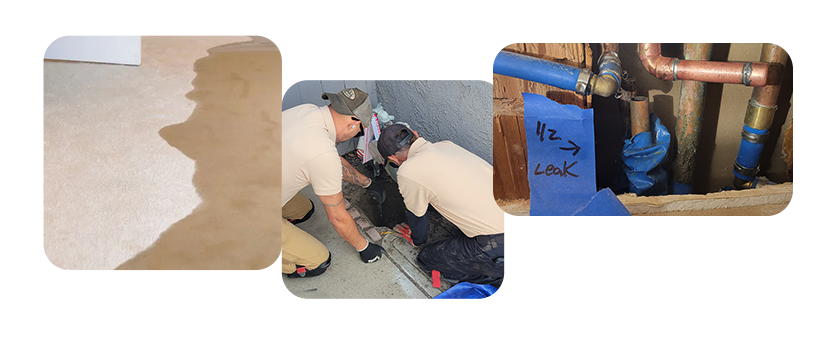Slab Leaks Orange County

Got weird warm spots on the floor? Or maybe your water bill shot up and nothing makes sense? Slab leaks can sneak up on anyone. And in Orange County, it’s more common than you’d think. These leaks hide under your concrete slab, and by the time you spot signs like warped flooring or water stains, it’s already doing damage.
Our team handles slab leaks in Orange County with the latest gear. We don’t just poke around with guesses. We’ve got high-frequency acoustic sensors, thermal scopes, and pressure testers. Once we pinpoint the leak, we explain the fix and get to work fast—so the mess stops growing. Whether it’s copper pipe corrosion or shifting ground that cracked a joint, we’ve seen it all.
Give us a call or book online today. If you suspect a slab leak in Orange County, don’t wait. The longer it sits, the worse it gets.
Story: Hidden Leak Under a Floor in Shady Canyon, Irvine
Last spring, a homeowner in Shady Canyon called about a warm tile floor in their hallway. They thought it might be the sun hitting it through the window. Turned out, it was a slab leak from a hot water line. They’d already noticed their water bill slowly climbing but didn’t think it was connected.
We used a thermal camera and acoustic sensor and found the exact spot. The leak had soaked the concrete below and softened the glue holding down the tile. We cut and capped the damaged section, then rerouted that leg overhead through the wall to avoid future slab issues. They even had us install an isolation valve for that line so they could shut it off easy next time. Flooring crew came after to reset the area.
They were relieved. They caught it before it reached the baseboards.
How Slab Leaks Happen in Orange County Homes
Slab leaks usually start from pinhole leaks in copper pipes, or joint stress from minor shifts in the soil. Homes built on concrete slabs have plumbing lines running under them—no crawl space, no attic. Over time, minerals in the water, small earthquakes, or just bad pipe layout lead to wear spots and cracks.
In Orange County, especially in older homes built before the ’80s, the pipe insulation wasn’t always great. Hot water lines tend to break down first. You might notice moisture, sounds, or hot spots—but sometimes it’s just the spike in your water bill that tips you off.
Homeowner Prep Tips
You don’t have to do much, but a couple things help. Clear the area where you’ve noticed heat, water, or staining. Move furniture out of the way if you can. If your home has a shutoff for different areas, jot down where they are. And if you’ve got photos of past plumbing work or remodels, that helps us trace the system faster.
Don’t stress—we bring floor protection, dust control, and clean-up gear with us.
DIY Slab Leak Detection Mistakes
Some folks try to trace a slab leak on their own. We’ve seen holes cut in the wrong rooms, pipes capped off in panic, and even thermal cameras rented without knowing how to read them. It’s not like a ceiling leak you can spot with a flashlight.
One guy thought the hot floor meant radiant heating was broken. He shut off his whole system and still had a leak pouring under the slab for days. Others hear water and rip out floors when it was just a dripping angle stop behind a cabinet.
Slab leaks need real gear and steady hands. If you’re not sure—call someone who is.
Related Services
- Slab Leak Detection
- Slab Leak Line Reroute
- PEX Water Line Installation
- Main Water Shut Off Replacement
FAQ – Slab Leaks Orange County
Common signs include warm floors, sudden water bill jumps, or damp carpet with no known source.
Yes. If left long enough, they can erode the base and cause slab shifts or mold.
Most are completed in one day. Complex reroutes can take longer, but we let you know up front.
Sometimes. Coverage varies by policy and whether damage occurred. We’ll help with documentation if needed.
Not always. We only open what’s needed and explain every step before we start.
Helpful Resources
- Helpful for understanding local ground condition
Orange County Flood Control District – ocflood.com




